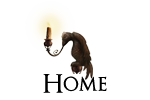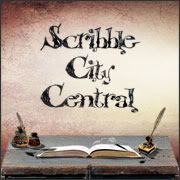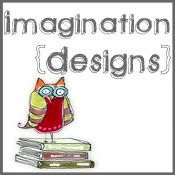To lure the inimitably crabbit Nicola Morgan to Scribble City Central once may be deemed a triumph. To do it twice is definitely a coup. When Nicola agreed to talk about the Oedipus myth and her utterly fabulous new novel Wasted (which I still can't stop thinking about), a few weeks ago, I was delighted, and I wondered if I might lure her in (with the promise of future champagne and biscuits) to do a regular MFI. To my surprise she agreed (so we'll be drinking the fizzy stuff at the Edinburgh Book Festival, where she and I are both appearing. Phew! I can finally say that without fear now the 'official' programme is out!). Once again, welcome, Nicola, and thank you for your great answers. I too am fascinated by Achilles--I don't like him very much, but you are quite right, his story encompasses so many interestingly contradictory themes of the human psyche. As for your answer to question 7--I can just see you in some Greek myth version of 'Chariots of Fire'--filmed in Edinburgh, as of course the original was!
PS: I've said this before, but if you lot ignored me last time and haven't read Wasted yet, please go and do so at once. No really. It's that good. And possibly even better. Definitely one of my 'Top Books of 2010'--but you'll have to wait till the end of the year to see what else I've chosen! Now, over to The Crabbit One herself....
1. Do you think that the retelling of Greek and other myths is important or relevant for the children of today? Why should they care about some “dry old stories” which come from ancient cultures they might never even have heard of?
I could say (and it would be true) that they’d find amazing connections between the myths of all cultures and our own more modern literature. I could say (and it would be true) that they’d be fascinated to discover how people from all cultures around the world have told many of the same stories, even before we’d crossed oceans and met each other. But I’ll just say that ancient myths are exciting, gruesome, violent, passionate, dramatic, romantic and exciting. What more can you want from a story?
2. What age were you when you came across your first myth or myths? Tell us how you felt then about the myths you first discovered. Did you love them or hate them? Did they scare you, excite you—or were you indifferent? What kind of myths were they? Greek? Norse? Native American? Celtic? Or from another culture entirely? Were they in a book you read? Or did you hear them as oral storytelling from someone else?
Greek and Roman myths were the first stories I remember enjoying. The Greek and Roman ones are basically the same, but I prefer the Greek names – they feel more exotic. I think it was all from books rather than orally. They were part of my education, so they were shown to me by my parents and teachers, but I don’t remember feeling I was supposed to read them – I just loved them from an early age. I collected books of myths. I remember they had a different smell, and always thick paper, as though they were special.
3. Looking back, what is your favourite myth of all time, from any culture? And why would you choose it?
The story of Achilles is fascinating. You’ve got a mother, the sea-nymph, Thetis, who tries to protect her baby from death, so she dips him in the river Styx to make him immortal; but she can’t fully protect him because she has to hold him by his heel, which misses contact with the magic water. Besides, she should know that even the gods can’t prevent a human from dying eventually. So, Achilles grows up strong and heroic, but his invincibility also makes him arrogant – because every hero (and every human) has a flaw, and in the Greek myths a flaw will always be punished. In the Trojan War, Achilles refuses to fight because he feels insulted by his commander. His refusal causes many deaths of his own side – so we should perhaps condemn him for this. He eventually decides to fight because the Trojan prince, Hector, kills his lover, Patroclus, so Achilles goes after Hector and viciously kills him, dragging him round the walls of the city in ugly triumph, after threatening to eat him. The story shows everything: a mother’s hopeless and misguided desperation to protect her child; heroism, determination and bravery; cruelty and nastiness, friendship, loyalty and love; the human failing of arrogance when we think we’re better or stronger than everyone else. And the inevitability of death: for, of course, Achilles does die in the end, wounded in the heel. This gives us the well-known phrase, “the Achilles heel” – meaning our weak spot, the flaw in our character that we need to watch out for. Oh, and the fact that Achilles was meant to be the best looking hero in the whole world, ever, helps the story’s romance! Mind you, he was by most accounts a really arrogant hero – which perhaps allows us not to mourn his death when it comes. Achilles is a terribly human mixture of bad and good. He’s certainly very far from being a saint, but I like the story because it’s full of contradictions. There’s lots to argue about.
4. Who is your most hated mythical hero or heroine, and what made you feel that way about them?: Hera, Zeus’s wife. She’s such a jealous, grumpy, vindictive, negative Nora!
5. Is there a mythical beast you are particularly fond of? If so, which one?
No, they’re all way too scary to be fond of!
6. How have myths had an influence on your writing life, if at all?
I find this really difficult – no, impossible – to answer. They’re just deep inside my consciousness and I don’t really notice their influence but I know it must be there.
7. If you could choose to be the demigod child of any one mythical god or goddess, which one would it be? Which power would you like to inherit from them—and what would you do with it?
Artemis, the goddess of hunting. Not because I want to hunt (!), but because she was also the goddess of speed and athleticism. I used to be a fast runner and I’d love to be able to run like the wind now, so if I could inherit her speed and fitness, that would be lovely. What would I do with it? I’d find a really long sandy beach on the south coast of England, or the west coast of Scotland, with no one on it (I might have to hunt and kill them first), and then I’d run, and run, and run, with my feet hardly touching the sand, the wind in my long hair (which I don’t have, but I would if I were Artemis’s daughter) and the sun on my skin.
More about Nicola:
Nicola Morgan is an award-winning author, mostly for teenagers – though she has also written some Thomas the Tank Engine books. She’s best known for her gruesome novel, Fleshmarket, her thriller, Deathwatch, and her internationally-acclaimed book on the teenage brain, Blame My Brain. She also blogs energetically on behalf of writers aiming for publication, and her book on the subject, Write To Be Published, will be published by Snowbooks in 2011. Her brand new YA novel is Wasted, which was published May 2010. Nicola lives in Edinburgh and London.
Nicola's brilliant Wasted blog is HERE
Her extremely useful writing blog is HERE
Nicola tweets as nicolamorgan
and her website is HERE
Friday, 18 June 2010
Mythic Friday Interview: Number 12 - Nicola Morgan
Labels:
Mythic Interview Fridays,
myths,
Nicola Morgan,
Wasted
Subscribe to:
Post Comments (Atom)

















11 comments:
We will indeed partake of the sparkly stuff togther in the magical yurt! And I am very much looking forward to it. Thanks so much for doing this interview - you took me right back to my childhood (and reminded me how much I'd forgotten of the myths, too).
Wonderful interview with my favorite crabbit (but only half as bad as she thinks she is) author. I heartily second the brilliance of her new book WASTED.
Although I can't point to specific ways that the myths have influenced my own writing (oh except for a never-to-be published sequel which had gorgons), I am sure that it's in there. The whole quest, heroic adventure plot owes everything to them. The flawed hero, tragic themes, all of that.
Although I did not like him because of his arrogance, I agree that Achilles is a very interesting character, more nuanced than Ajax for instance who is just a boor.(And a bore).Odysseus is still my personal favourite because he endures and is faithful and although he is an adventurer he just yearns to get home.
Just to prove to the COB that someone has looked at this (so she can stop complaining on Twitter) I am putting a cautious paw print on the page.
Thankyou for the insights. (Definitely worth the bubbly and biscuits!)
Myths fascinate me but I think we need to re-use them cautiously. They can come back to bite.
Loved this interview. I am very fascinated by myths and legends and loved the way Nicola used Oedipus in Wasted, which incidently is an awesome book - the best book I have read for a long time.
That yurt is indeed going to see some serious partying, oh Lovely Crabbit!
Jo--BOTH Ajaxes are boors and bores. You are so right about the plotting thing. Every time we use the Hero's Journey in any form, it leads straight back to myth, whether from Greece or any other culture.
Cat--I appreciate the paw print, and am sure the Crabbit One does too. But I'd like to hear more about why you think myths can come back to bite. That sounds really interesting...can you tell us more about your experience with this?
Nicola K (and Jo again)--it's good to find more who agree about WASTED's brilliance. Go thou out there and preach to the masses who haven't heard of it yet!
Achilles is my favourite boy too! Oh dear, I confess I'm really very fond of him, for all his faults and his VERY bad temper. I'll never forgive Brad Pitt for 'Troy'...
Really enjoyed this interview, Lucy & Crabbit :-)
Gillian - I'll fight you for him!!
I think it's really hard to explain why myths are so important. I suppose it's that they bind us together, and that they show the eternal human condition. They are also so accessible - whereas Shakespeare (who, of course, uses lots of the myths) is hard to read and hard for many people to "get", anyone can enjoy reading or listening to the myths.
I could write an essay on the topic but, as I see it, you can retell the story of a myth or you can use the myth to tell a story.
If you do the first thing then you have to honour the story and the culture it comes from. If you do the second then you need to acknowledge, at least to yourself, that this is what you are doing - so that you can break free and create something new.
Sorry, that is probably too brief to make sense. Does it help at all if I say that, living in Australia, I would not use a story from the Dreamtime of the indigenous Australians in either way...they are not mine to use.
Lucy, if you have time, head on over to my blog...I tried to explain a little more. Cat
Nicola and Gillian--no fighting over Achilles, girls.
Cat--you HAVE written a marvellous essay on the subject. That's a great blogpost, which I really enjoyed, and anyone who is interested in this debate should go and read it at http://thereandbackbytricycle.blogspot.com/2010/06/there-are-stories-you-should-not-tell.html
I'd just like to mention a couple of things you said here because I think they hit the nail on the head. Firstly, you say: "The story has to be consistent with the original. In other words you have to honour the story - and the culture it comes from. Greek myths and legends, Norse myths and legends, Celtic myths and legends are all part of our received culture. We can use them but we still need to honour the story." Indeed we do. I do not take lightly the task of retelling. Because I retell for children, there are certain difficulties--which I have talked about here and elsewhere--to do with certain things within the original tales such as adultery, incest, rape, bestiality and so on. So my way of honouring the story is to go to the heart of it, to take the kernel of its meaning and tell it in a responsible way for the age group of the children who will be reading it. Later, they may want to read more and discover the original tales for themselves. With the Celtic tales--well, they are my own heritage, and honouring them is second nature. I think what is key here is the word essence. To honour these tales, we must respect the essence of the myth above all else. I’ve based characters in my novels on mythological beings—they are part of the story I have created—but their essence is always true to the originals.
Secondly, you say: "A society without myths and legends is a society without a past and it is a society without a future. If we do not use myths and legends in an honourable fashion or if we ignore them then they will come back to bite us. They are part of our past. We have to use the past to understand the present and prepare ourselves for the future." One of the greatest things about myths, in my opinion is that they teach us lessons about life—about those archetypes of humanity which are eternal and which repeat throughout our history. We need to learn those lessons—like the lessons which history has to teach—or they will indeed come back to bite us.
Thank you so much for contributing to this debate—I really appreciate your taking the time and trouble.
Thankyou for coming over to visit Lucy. I had been planning to talk about something else yesterday - a related something, language loss. I'll get back to it now.
Post a Comment